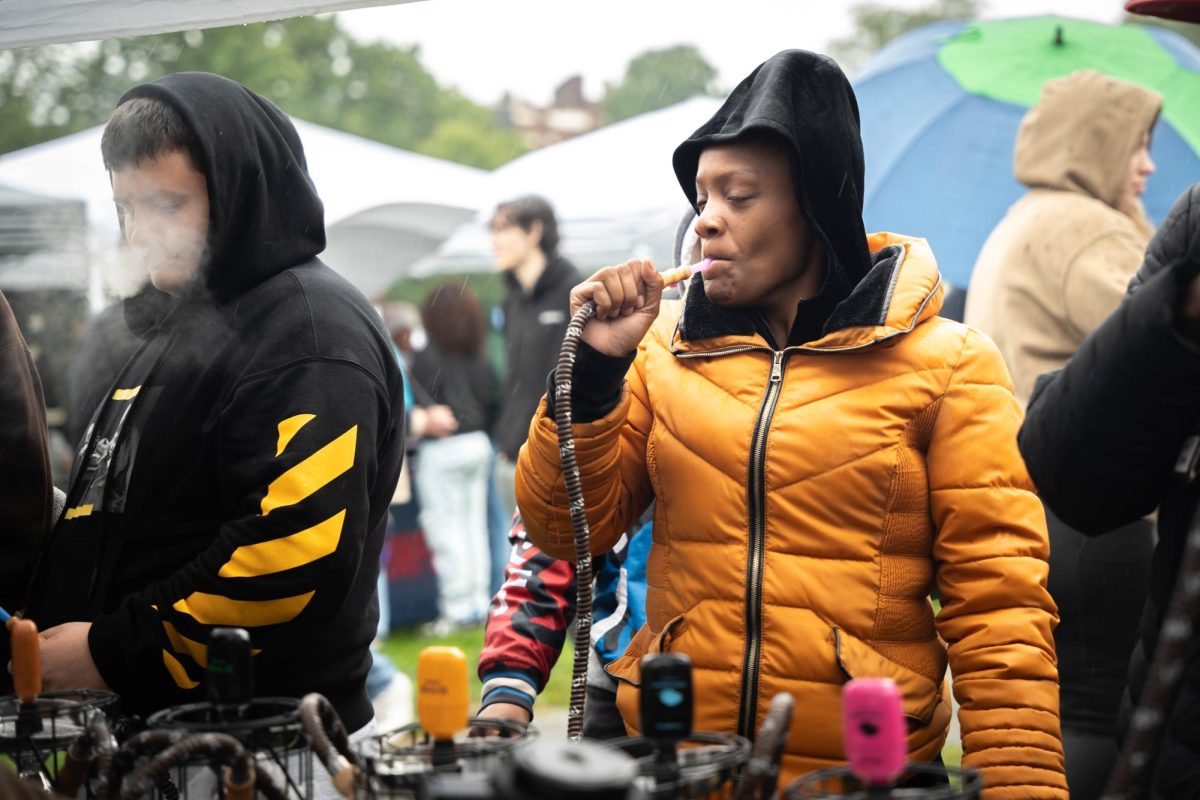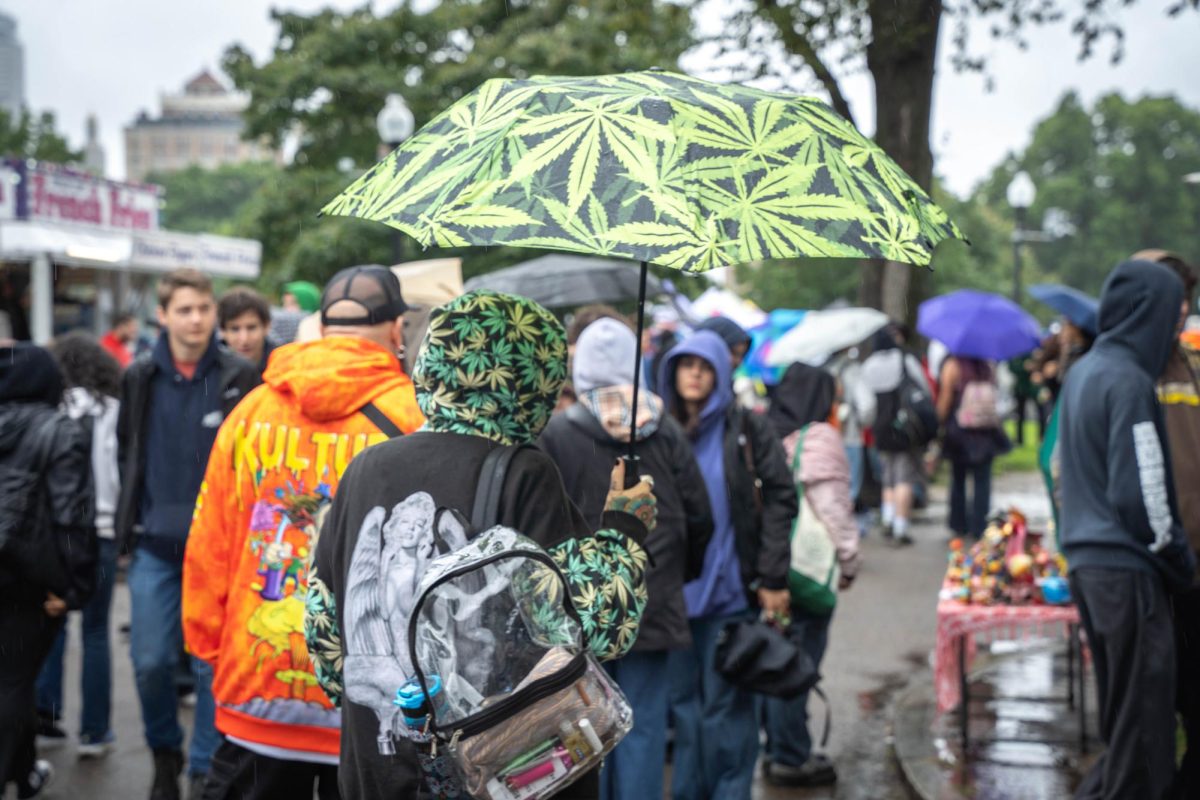Hundreds of cannabis fanatics gathered in the Boston Common on Saturday for the 35th annual Boston Freedom Rally, the second-largest advocacy event for marijuana in the country.
Since 1989, the Massachusetts Cannabis Reform Coalition (MassCann) has advocated for marijuana law reform at the Boston Freedom Rally. Equipped with cannabis-themed umbrellas and bright green raincoats, an enthusiastic crowd of attendees celebrated under the heavy rain. Over 200 vendors filled the sprawling wet ground, offering marijuana-related items—ranging from decorative necklaces to cannabis-infused cookies, dried fruits, and Kool-Aid.
The theme of this year’s event was “Keep the Joint Rolling: Continued Advocacy.”
“We’re trying to make sure that people can have a chance to come out to this event and have fun, but then also learn something about cannabis, because there’s so much misinformation out there,” said Richard Tamalavitch, chair of the education and legislative committee at MassCann.
Tamalavitch said that marijuana has had a positive impact on his life.
“I use it to help with anxiety, and it changed my life,” he said. “When I started smoking it every day, I noticed the anxious voices in my head calm down.”
This year, Tamalavitch helped organize six panels for MassCann’s “Educational Village,” which covered a variety of topics from legislative agendas to queer cannabis history, hash baking, and innovative manufacturing technologies.

One of the speakers at the Education Village, Richard Evans, is an attorney from Northampton, Mass., who’s been advocating for the legalization of marijuana for over 40 years. After Massachusetts voters elected to legalize the recreational use of marijuana in 2016, Evans helped write the bill, which was the high point of his career.
Evans said that to pass the vote in 2016, he and his team agreed to add strict regulations by the Cannabis Control Commission (CCC).
“That gave us the opportunity to argue that legal marijuana would actually be much safer, more protective of the public interest than illegal marijuana,” he said.
Now, Evans is encouraging people to build relationships with their local legislators in hopes of having some of those restrictions loosened.
Massachusetts legalized the medicinal use of cannabis in 2012, only four years before full legalization. The Massachusetts Patient Advocacy Alliance (MPAA) is a non-profit organization created to support over 90,000 medical cannabis patients in the state.
“We’re here to connect with patients and make sure they have the resources they need,” said Jeremiah MacKinnon, MPAA’s president. “We’re here to advocate for them.”
MacKinnon said that the group helped pass the ballot initiative to legalize medical marijuana in 2012, and has worked to oversee fair regulation ever since.

Recently, the MPAA has focused its advocacy efforts on removing a vertical integration regulation. According to MacKinnon, this regulation forces medical cannabis distributors to invest more than recreational distributors and oversee every aspect of the supply chain.
MacKinnon said medical distributors “don’t have the resources,” to fulfill these demands and added that about four medical dispensaries have closed this year alone due to financial struggles. He said that without medical dispensaries, patients would have to opt for recreational dispensaries, spending a lot more out-of-pocket money to afford their medical needs.
The ground around the vendor’s tents became soggier as rain downpoured, but the elements did not deter the large crowds.
“The rain is not going to keep us away … I’ve been here for a while,” said Cesar, who preferred not to divulge his last name, from NYCeeds, a vendor who modifies cannabis seed genetics.
“My first Freedom Rally was in 2010,” he added. “It’s grown slowly but surely every year.”
For others, the Boston Freedom Rally is simply a good time. Spirits were high, with many attendees dressing up in cannabis-inspired outfits ranging from weed bucket hats to graphic T-shirts and even jumpsuits.
“I’m just trying to spread the good vibes,” said Ty, an attendee dressed as Jesus while smoking a cigarette.

Charlie Lay, a junior visual media arts production student at Emerson, was in the eclectic crowd for a different reason.
“I’m raising money for my short film ‘An Irish Exit’ by doing a little baked sale,” he said while holding a cardboard box filled with varying snacks. “We got a lot of snacks and we’re selling them to people who got the munchies.”
Audrey Smith, who identifies as “the Green-Grown Woman,” traveled from Connecticut to share her story with the festival’s attendees. She mounted a phone with a live recording of the festival on her shoulder.
“I’m a cannabis advocate, educator, and content creator,” Smith said.
Smith believes that destigmatizing cannabis can increase education and knowledge around it, which she hopes will give access to those who need it.
“Federally, we need to see de-scheduling and not rescheduling. Alcohol is not scheduled on the federally controlled substances and it’s arguably far more dangerous than cannabis,” she said.
“In my house, we try to normalize cannabis like a tomato plant,” she added.
Smith grew up in cannabis prohibition and adopted anti-legalization beliefs. When she reached her 30s, Smith began suffering from a medical condition and was introduced to cannabis as a solution.
“Everything that it does for me, I know it can do for other people,” she said.